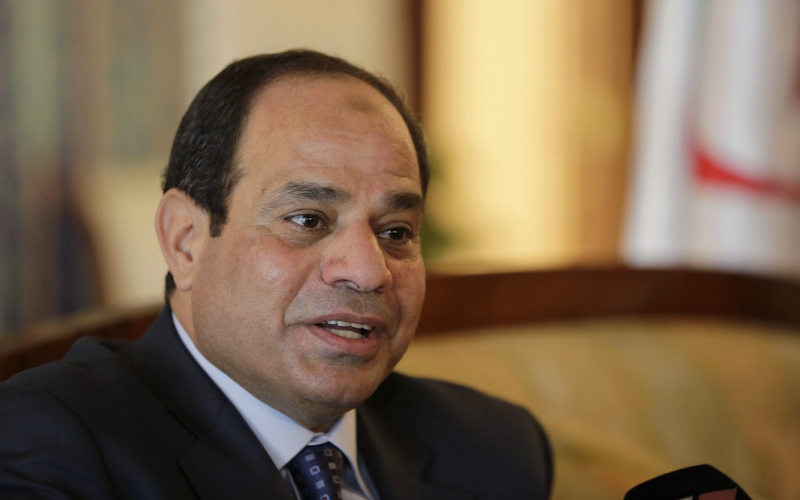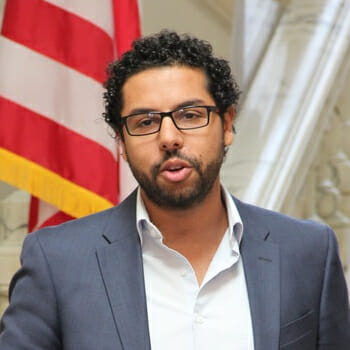
Sisi: His Throne is in Peril
Islamist and revolutionary movements aside, Sisi’s regime is encountering a slightly different but equally significant threat from his own loyalists.
To elaborate on this thesis, one must scrutinize Sisi’s entourage that can be categorized into mainly two camps. The first camp includes the regular state institutions such as security agencies, judiciary, foreign service and obviously the military while the other camp is comprised of former National Democratic Party (NDP) figures as well as the business tycoons that control the influential media in Egypt. Although each of those camps and perhaps each of those institutions subsume some internal dissensions/contentions among its powerful wings over multiple issues yet they still act in unison as one stent to Sisi’s regime.
The dynamics which created these institutions have been fairly fixed since the 1952 coup despite small variations enforced by the different styles of the successive political leaderships. On one hand the state institutions work to secure the ruling regime while, on the other hand, private media carries out the propaganda needed to back their decisions and promote the government regardless of the quality of its performance.
The first camp includes state’s ageing institutions which, where functioning, are handcuffed not only by rampant corruption but more importantly by insular mentalities that have hindered the progression of creative thinking and structural development that could have helped those institutions flourish and prosper. Ultimately, a state of stagnation rendered those institutions unqualified, rigid and unable to deal with the current challenges.
Ever since January 25, 2011, the state was compelled to deal with difficult challenges that rely on sophisticated technologies, but because their workforce was neither trained nor prepared they couldn’t properly handle unfolding events. In fact it was not just a matter of ability to handle, the officialdom is so old and rigid that they were not even aware of the necessity of improving their outdated methods to keep pace with the outside world.
The fact that the military junta restored outdated solutions to deal with the July 3 coup reveals the “Island Mentality” of the state institutions. A common practice by Egypt’s successive dictators in times of crisis was to broadcast patriot songs around the clock, circulate pro military statements by famous celebrities and most importantly to disseminate myths about the army generals’ role in saving Egypt from a hidden jeopardy. From 1952 to the present, the same methods have been employed over and over with very little change causing unprecedented deterioration.
The mindset overpowered logic and resisted improvement and reform. Even the few attempts to install modern progressive solutions at the top of those institutions were countered and rejected. An example of that is the appointment of the prominent Egyptian scientist, Dr. Essam Heggy, as an advisor to Egypt’s interim president. Dr. Heggy’s appointment coincided with the scientific scandal in the Egyptian army which claimed to possess (false) medical invention to treats AIDS and Hepatitis C which was supposed to enhance Sisi’s image locally and internationally. Dr. Hegy harshly criticized the disreputable invention. As a result he was accused by the institutions of being an American spy, a member of the Muslim Brotherhood member and of undermining Egypt’s national security.
This same mindset most likely suggested shutting down the internet in Egypt in January 28, 2011 on the assumption that this would defeat the protestors. And, yes, they are most likely again to be the one who advised Sisi to take a bunch of local celebrities with him to Germany on the assumption that this would change German public opinion about the atrocities being committed in Egypt.
The institutional deviance gave state agencies free rein to violate laws and regulations as long as they followed traditional institutional norms. A police officer will now feel free –and more importantly- will be supported in arresting a 17-year old kid with charges of undermining national security, a prosecutor will endorse the case and finally a judge will add insult to the injury by giving this kid a death penalty. This is a true story of Ahmed Zaghloul, a child who has been sentenced to death in Elmania, Upper Egypt.
The other camp includes former NDPs and business tycoons who control the media. Unlike the state institutions, Egyptian media doesn’t suffer a sterile bureaucracy nor an old-fashion working style. However, they suffer from the nexus of interests between the government and the business tycoons that obligates journalists to cover favorably certain people over others.
Well, obviously media has a bias toward the political orientation of its donor/sponsor and they will –in a way or another- work in their favor. But the problem in Egypt is the irrationality and nonsense that has overwhelmed its long-established media. TV presenters compete in the balderdash. “Muslim Brotherhood paid the German media to criticize Sisi,” said Ahmed Mousa, a well known pro-Sisi TV presenter. “Whoever has a problem living in this country should grab his passport and leave,” said the TV host, Tamer Amin, addressing those who complain about unemployment and price hikes. Those models of journalists do not need instructions or recommendations from Sisi’s regime anymore. Their own model of propaganda that in many cases can actually be very cheap and pathetic, already satisfies Sisi’s ego but not necessary the world’s view of him.
The surreal scene of Sisi’s visit to Germany in June 2015 sums up the finest production of both camps’ efforts to refine Sisi’s global image. Outdated methods supported by not-at-all credible media propaganda simply produced the bizarre scene. It is not necessary that Sisi himself ordered each individual to prove his loyalty to him by committing irrational acts, but Sisi –just like any other dictator- is pleased with the growing amount of a supportive entourage. The common ground here between the two camps is their consumption of methods that do not appeal to the domestic or international audience yet both camps carry on.
In the past, institutions functioned under the authoritarian command of Mubarak whose regime was experienced in handling their behavior. But in Sisi’s case, the rampant level of delinquency and irrationality that surrounds his regime runs counter to his interests. He is simply unable to control them for multiple reasons that could vary from lack of will to his inability to realize the problem itself. Sisi himself is a product of those institutions. He was raised, educated and is an integral part of their doctrine so chances that he realizes the fatality of these flaws –let alone the need to reform them- remains slim.
In short, the archaic institutions are working effortlessly to support Sisi’s global posture as well as his domestic projects but because of the insular mentalities that run those institutions, their role has become the hidden threat to Sisi’s power. In 2015 Egypt’s officials believe they can deceive the world by promoting false science using the same methods that their predecessors used when they governed those institutions back in 1950s! Sisi’s regime will only recognize this fatality when the international community further downgrades his posture and when Egyptians run out of patience and recognize that no single progress has been made in any field including security -which was a prime reason why people voted for Sisi. By then, it will certainly be too late for him to reform or repair the damage.

